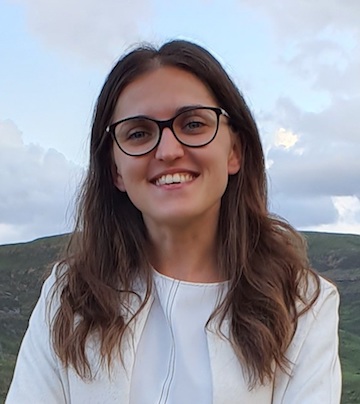 Valentyna Golubenko
Valentyna Golubenko
Leadership and Management Development Expert
Capacity Building Directorate
World Customs Organization
Public Finance Program (’15)
Please tell us about your career path so far.
At first sight my career path might seem like a hop-on-hop-off journey – so many projects I was involved in, in different roles and at numerous places! But when I look back, I clearly see myself walking a rather structured career path which helped me grow and evolve and eventually arrive at where I am now – an international expert in leadership and management development (LMD).
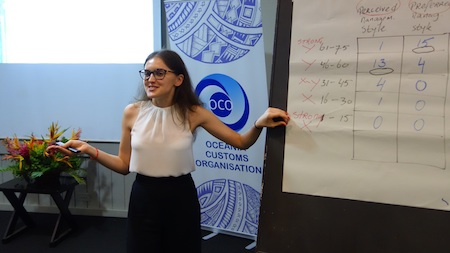
Delivering a regional LMD Workshop for senior and executive managers of Oceania Customs Administrations (December 2017)
I started as a cadet in Customs Academy, studying law and living a disciplined life of a person in uniform, as you can imagine. From there I have been gradually moving on throughout almost all levels of the organization: first serving as a customs inspector at the western border of Ukraine, then as a legislature developer in the headquarter of the State Customs Service, later as a deputy manager of a small policy monitoring unit in the Ministry of Revenue. And after returning home from my studies in GRIPS, I entered another fascinating and challenging area in the State Fiscal Service – reforms and projects management, strategic development and international cooperation, where I first served as a manager of reforms office and later as a deputy director of the entire department in that domain. In between, during 2016-2017, I even managed to work as a Professional Associate in the World Customs Organization (WCO), where I first got involved in its LMD Program.
For many years, interaction with various government agencies, international organizations, expert and donor communities have been my daily agenda, as I strongly believe in joint efforts for building better organizations. From first-hand experience, I came to realize that so much depends on the organization’s leadership and management culture. More and more my professional focus has changed from content, operations and procedures to more profound and important aspects of work: building healthy and cooperative relationships between all levels of the organization, creating commitment to change, supporting and inspiring leaders and managers in the implementation of modernization initiatives. Naturally I have become capable of providing such support to not only my home administration, but to leaders and managers around the world. In 2019 I was invited by the WCO to work there as the LMD Expert.
You are currently serving as Leadership and Management Development Expert at the World Customs Organization in Brussels. What are your main roles and responsibilities?
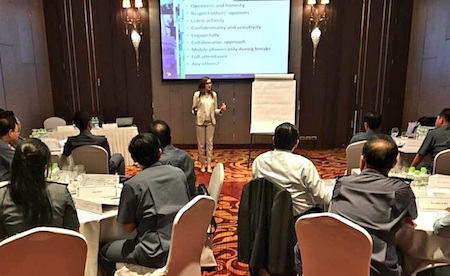
Valentyna delivering the very first LMD Workshop in her career to senior managers of Cambodia Customs (June 2017)
As LMD Expert I perform three main roles: facilitator of various LMD workshops, developer of the workshop material and coordinator of the LMD facilitators team.
As facilitator I work directly with managers of higher levels of the organization, mainly in the format of a four-day retreat with the top executive management team or a two-week LMD workshop for a group of senior managers. During these activities I help managers develop modern leadership and management skills, attitude and behavior based on greater awareness and knowing oneself, conscious self-management, real understanding of others and having a positive impact on others. Also, I work on a deep personal level and coach managers to integrate these insights into their daily management and to better contribute to modernization processes of their administration.
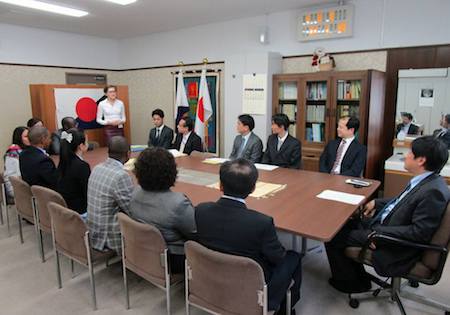
Addressing Tokyo Customs management on behalf of the WCO Professional Associates during a study visit to Japan as part of the WCO Career Development Programme (April 2017)
As developer of the workshop material I conduct research on the latest trends in leadership and management, incorporate feedback from participants and fellow experts and update or completely review the material so that participants of the LMD workshops benefit from a unique, high quality content and facilitation approach. As coordinator of LMD facilitators I am involved in the search and selection of potential facilitators and later on in the development of the selected facilitators, ensuring that they master facilitation skills and fully understand the workshop material.
I am passionate about all three roles and find them so fulfilling! For as much as consuming the role of LMD Expert can be, I am convinced that regardless the setting and the organization I am working for, I will always be advocating for modern leadership and management culture and try to change the environment accordingly.
What are some of the biggest challenges you face in your work? And what have been the most interesting or rewarding aspects of your career thus far?
The LMD retreats and workshops are amazingly intense, innovative and interactive activities. They demand a lot not only from participants, but first of all from facilitators. To inspire managers to really learn and change demands full-time attention, focus, energy, sensitivity, appeal and so on. This can be quite consuming: every time during the workshop you are just in a flow and do not notice (and frankly, do not even mind) how much you give away, but after such intense work I personally need some time to restore my inner energy.
Another challenge for me is to continuously live up to what I preach myself. It means being constantly aware of what I do, think, say and feel, trying to really see and understand others, staying kind to myself and others. In some situations and with some people it can be so difficult!
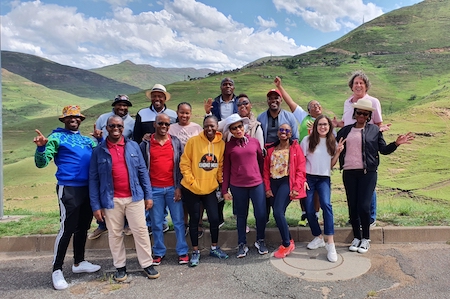
Completion of the LMD Workshop for senior managers of Lesotho Revenue Authority high in the mountains of Lesotho Kingdom (January 2020)
Talking about the most rewarding thing in my work, it is to see participants actually progressing in understanding and implementing modern leadership and management skills, attitude and behavior. It might not necessarily happen during the workshop, and might not even be on a scale of the entire organization. Often participants share their insights a few weeks or months later and are always so genuine and sincere in their stories, demonstrating that even a small change on a deep personal level can have a big impact on their performance as managers.
What I also find so interesting when working with managers is that you eventually discover no differences between countries, cultures, religions, gender! As I worked with managers from diverse backgrounds, I see that on a deep personal level we all face similar fears, suffer from similar beliefs, follow similar patterns. And we all equally appreciate kindness, respect, sincere emotions, open communication, trustful and supportive relationships. We all equally crave for being valued, heard, understood, loved. With all this in mind I intent to inspire leaders and managers to shift their focus to this powerful and universal paradigm.
What led you to GRIPS? What is the most important thing you got out of your studies here, and how has your experience at GRIPS prepared you for future endeavors?
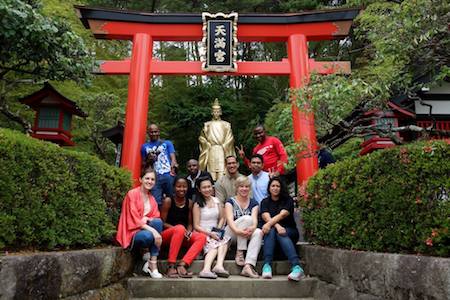
Visit to Edo Wonderland in Nikko with GRIPS friends (June 2015)
Choosing GRIPS for my postgraduate studies was my boldest and most rewarding decision. I knew that GRIPS provided endless opportunities for research, chances to learn from internationally recognized experts, Japanese state agencies and corporations. I also knew that I would learn a lot from Japan, its people, culture, art, nature, spirit. Furthermore, I was also attracted by the idea of pursuing my studies in such a multi-cultural community as GRIPS is. Living and studying and building a network together with my fellow students – so goal-oriented, open-minded, thirsty for knowledge – is one of my most important takeaways. That experience has enriched me a lot! I returned from GRIPS as a more confident and open person, with a much stronger voice, broader perspective and international orientation. These reinforced qualities have been helping me so much throughout my career.
Have you had any involvement, professional or otherwise, with Japan since your graduation?
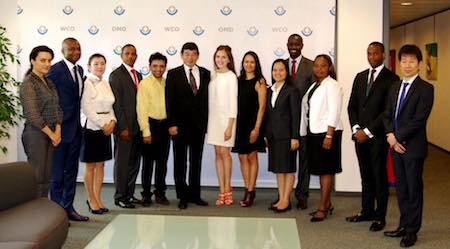
With the WCO Secretary General Mr. Kunio Mikuriya on the first day as Professional Associate of the WCO Career Development Programme (September 2016)
In one way or another, I have constantly been in touch with Japan since my graduation. It all started with a funny story: when I was flying back home, shedding tears because I had to leave Japan, I saw in an onboard magazine a competition announced for the best video with hashtag #MyJapanStory. The winner was promised a trip to Japan, so without any doubt I decided to participate! I have submitted a number of memorable videos (you can check it out here too), but unfortunately I didn’t win. Later that year I started my work as Professional Associate in the WCO. This assignment was part of the Career Development Program funded by Japan Customs Cooperation Fund, which – as you might have guessed – included a study-visit to Japan! Just imagine how happy I was to go back again! Also, on my first day as Professional Associate I discovered that Mr. Yoshihiro Kosaka who used to be our lecturer on Practicum in Customs Administration back in GRIPS, now works for the WCO too; during my first mission as LMD Expert to Cambodia I met another lecturer from the same course – Mr. Shigeaki Katsu – who at that time was seconded to Cambodia as Customs advisor. Apart from that, professionally I have also cooperated with Japan International Cooperation Agency (JICA) on some projects for Ukraine. And of course I can’t forget my dearest friends that I met in Japan with whom I still stay in touch. With some of them we even meet in the professional setting, for instance, when they come to the WCO as delegates from their home administrations.
You have been living away from your home country for quite some time. What do you like about living in Belgium? And what you miss about Ukraine?
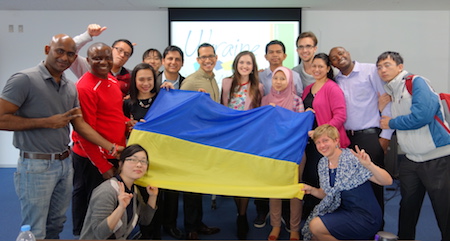
With GRIPS friends after presentation of my home country Ukraine at Brown Bag Lunch (March 2015)
I find Belgium a very conveniently located country, you can easily reach basically everywhere in Europe from here. And that is the kind of escapes I do whenever I feel bored with rainy weather or become too annoyed with never-ending roadworks and construction sites of Brussels. On the other hand, Brussels and Belgium as a whole somehow do manage to satisfy my biggest cravings – those for art and nature. So many international film and music festivals, exhibitions, concerts, art fairs, colorful celebrations of historic events. So many charming towns, forests and parks with hiking trails, the coastline with sand dunes. And, be it cliché, Belgium is the country with the most tasteful beer.
As for Ukraine, frankly, I do not miss it that much. Maybe because it’s my home country and it will always be there. Maybe because I regularly visit my family and friends there, and they in turn come to visit me here, so there is no sense of distance. That “missing” hits me mainly when I am challenged with things like bureaucracy, for instance. In my home country I know and understand how it all works, but living abroad you need to learn and comply with local procedures and regulations, sometimes incomprehensible ones. Also, even though Brussels has been improving in these directions lately, I do miss the stylish cafes and people, beauty services and coffee culture in my two home cities in Ukraine – Kyiv and Dnipro.
How do you maintain a balance between your work and the rest of your life? And what is your favorite thing to do when you are not working?
I do not have a hobby, not in its traditional understanding. Normally, after work I would go to an exhibition opening, attend a local band performance or a plant-swap event, walk in the botanical garden, or relax on a terrace of one of the numerous local pubs or cafes. On weekends I would most probably be away bicycling or discovering some small town or trying to find some Flemish architect’s sculpture in the middle of a cornfield. But lately, since social distancing became the norm, I find it very challenging to balance my work with the outside-of-work activities. I am now trying something new – volunteering giving gymnastics lessons, so far I find it a quite enjoyable, and healthy, activity.
What are some of your fondest memories of your time spent at GRIPS? And what do you miss about Japan?
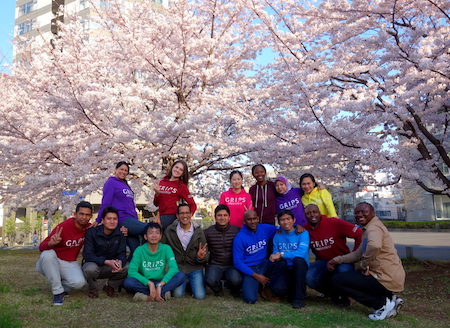
GRIPS Public Finance Program 2014-2015 in sakura blossom (March 2015)
It is almost impossible to describe it in just few words! When talking about studies, it is so funny that now I can hardly recall any struggles while there were quite some. I mostly remember those overwhelming feelings of joy, relief, pride, achievement associated with every exam passed, with the research paper being accepted, with the diploma finally being handed over in my hands. The most prominent, of course, are memories of the time I spent with my GRIPS friends: studying together until late hours, missing the train, cooking for each other, enjoying Japanese sake parties, conquering (or being conquered by?) Fuji-san and so on. Honestly, I don’t think I have ever laughed as much and as loud as I did during that year in GRIPS! I really miss how Japan made me feel then. And from time to time I also miss fresh Japanese seafood, endless rows of blooming sakura trees, smooth pavements where I could easily wear my high heels, punctuality of the public transport schedule, cleanliness everywhere and breathtaking art events all year around.
If you could give one piece of advice to anyone considering studying at GRIPS what would it be?
I certainly recommend GRIPS as an incredible platform for studies, building networks and rediscovering yourself. Before applying, carefully check the program’s description and curriculum, approach some current students, alumni or professors for more details in order to fully understand what is expected from you, what is in it for you, how this contributes to your life goals. These are probably too obvious things, but believe me, the GRIPS experience is much more fun when it is your own, a well-thought through choice. I would also advise against all possible fears and hesitations that could keep you away from such a life-changing opportunity. It is absolutely worth fighting for. As an example, I was only admitted to GRIPS from the second attempt and I am so grateful I didn’t give up after the first unsuccessful one.
How would you like to maintain involved with the School? What do you expect from GRIPS as an alumnus and do you have any suggestions on how to further utilize the GRIPS alumni network?
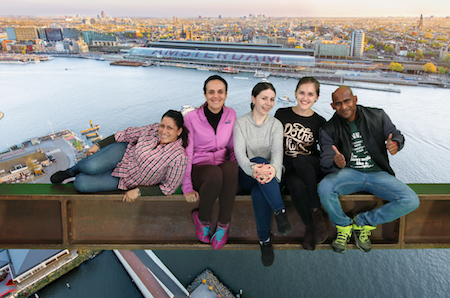
Reuniting with GRIPS friends in Amsterdam, Netherlands (October 2017)
I have always regretted not being able to attend the homecoming and reunion events and to once again return to such a special place which GRIPS is to me. Now I am very excited to have attended at least the first virtual reunion on September 12!
On another note, if there is such an opportunity, I would also love to work with GRIPS and its students in the area of my current expertise – leadership and management development. The more I work with managers, the more I realize how essential it is to learn and develop modern leadership and management skills, attitude and behavior as earlier in your career as possible. In fact, my bold dream is that LMD becomes part of every curriculum of every school and university. Who knows, maybe this will be another turn in my career – working closely with the educational sector on LMD.
Regarding how to further utilize the GRIPS alumni network, I think as we all continue our journeys – academic, professional, personal – we have so much to share and learn from each other. Having an opportunity to meet up regularly (monthly or quarterly) could be great. Of course, face-to-face meetings for various reasons might not be possible for some alumni, but a plenty of online platforms can be used as alternative. The format of such meetings can be flexible, for instance:
- a series of conversations/discussions on a particular topic of interest (academic- or professionally-related), maybe even targeted to a limited group of alumni with expertise/interest in that area;
- a series of live Q&A sessions between alumni and applicants or freshmen where first-hand experience and tips-and-tricks about living and studying in GRIPS could be shared;
- could also be some personal and emotional stories sharing on various challenges faced while applying for GRIPS, studying there, living far from home, returning home from studies and trying to make use of the gained experience etc.;
- a video (or photo, or essay) competition from different programs of different years, can be as an individual or a group competition;
- a live/online quiz on how well you know GRIPS (campus and its neighborhood, professors, events, alumni platform etc.);
- maybe some of alumni could host a fun workshop on learning a new skill, like a set of useful excel functions, practical PowerPoint designs, make-ahead student lunch ideas (bento box), singing, origami, riddles solving etc. – just anything half educational-half entertaining to gather people around. It is also fun if GRIPS staff, professors participate too!
Of course, imagining how busy and preoccupied we all can be with our daily agendas, some additional incentives to contribute and participate in such events might be needed. All depends, but could easily be some kind of online certificates or LinkedIn badges for participation in an academic or professional discussion, free text book, free coffee treatment on campus or ticket to a museum or something (I am just thinking out loud here).





